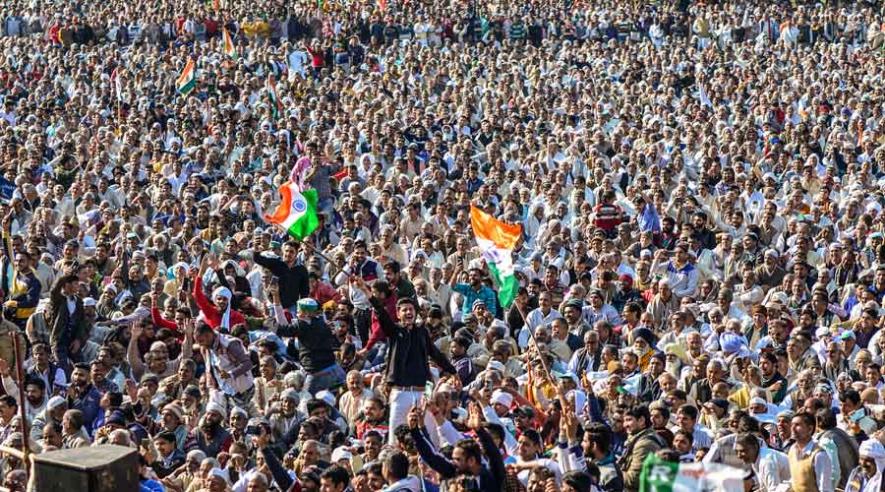Bihar: Protesting Mukhiyas to Hold Mahapanchayat on October 2

Representational Image. Image Courtesy: PTI
Patna: Elected village body heads, known as Mukhiyas (Heads), in Bihar, are set to organise a Mahapanchayat on October 2, coinciding with Gandhi's birth anniversary, in Patna. They are protesting against the Bharatiya Janta Party (BJP) )-led central government and the Mahagathbandhan-led state government for their failure to meet their demands.
"We will convene a Mahapanchayat at the historic Gandhi Maidan here to voice our protest against the BJP-led central government and the Mahagathbandhan-led state government. Both governments have ignored our concerns, and we have decided to escalate our protest," stated Mithilesh Kumar Rai, the president of Bihar Mukhiya Sangh, in an interview with NewsClick. Rai revealed that this decision was reached during a state-level meeting of the Mukhiya Sangh on Friday night.
Following the Mahapanchayat, protesting Mukhiyas plan to encircle the residences of Union Rural Development Minister Giriraj Singh, Bihar Rural Development Minister Shrawan Kumar, and Panchayati Raj Minister Murari Prasad Gautam, Rai added.
Over 8,000 Mukhiyas have been protesting across the state since mid-August to support their 19-point demands. In the initial phase, they boycotted all government activities and meetings related to various schemes. Additionally, they staged dharnas on August 22 at block headquarters and on August 29 at district headquarters to express their dissatisfaction with the indifference of both the Centre and state government towards their concerns.
The protesting Mukhiyas have submitted a memorandum outlining their demands to all MLAs and MLCs from ruling and opposition parties and have sought their support. Rai emphasised that the Mukhiyas' protest has severely impacted the functioning of panchayati raj institutions, leading to a halt in development work in rural areas of Bihar.
The primary focus of the Mukhiyas' protest is to expose the erosion of rights and powers of Panchayati Raj institutions by the Centre and state governments in the execution of development and welfare schemes.
Their key demands include increasing the monthly allowance to Rs 10,000 for Mukhiyas, Rs 7,000 for deputy Mukhiyas, and Rs 5,000 for ward members and other elected panchayat representatives. They also urge the Centre to provide grants to the panchayats in line with the recommendations of the 15th Finance Commission, along with security measures and compensation of Rs 50 lakh for families in case of harm to panchayat representatives due to criminal incidents. Furthermore, they advocate for paying Mahatma Gandhi National Rural Employment Guarantee Act (MGNREGA) wages directly to the panchayats and implementing Nal Jal Yojana at the panchayat level, replacing PHED. They highlight that the government has outsourced the Mukhyamantri Solar Light Yojna and the construction of Panchayat Bhawan to private agencies.
Bihar has 8,442 village body heads, 8,422 sarpanches, 1,15,542 panchayat members, 11,534 panchayat samiti members, and 1,162 zila parishad members.
Several Mukhiyas expressed discontent as the government denied their rights and powers, which were constitutionally granted to strengthen the three-tier Panchayati Raj institution. Mukhiyas mentioned that the government has yet to provide them with security despite the threats to their lives from gangsters, criminals, and rivals. "We are facing threats to our lives from gangsters, criminals, and rivals, and the government should provide us with security and arms licenses for protection," said Rameshwar Yadav, a Mukhiya.
Another Mukhiya disclosed that local criminals demand taxes and threaten village heads with dire consequences if not paid. Security concerns have been a persistent issue among Mukhiyas in the state, and they have repeatedly requested arms licenses for bodyguards, but the government has not responded.
According to activists working in rural areas, widespread corruption in state and central government-funded development schemes in rural areas has elevated the Mukhiyas' status, making them susceptible targets for criminals and political rivals. With a large number of unemployed youths in the region, they are often hired by gangs to target Mukhiyas for monetary gain.
Most Mukhiyas lose their lives due to disputes with local criminals, gangsters, or conflicts related to development work in their areas, the activists noted. According to police records, this year alone, three Mukhiyas have been killed by criminals in Bihar, and half a dozen have been attacked, shot, and injured.
After the Bihar government reserved 50% of seats in panchayat polls for women, hundreds of women Mukhiyas have been elected. However, it is important to note that not all are merely figureheads for their husbands. Many of these women Mukhiyas are actively involved in governing their respective villages, thus contributing to a unique power dynamic in these areas.
Get the latest reports & analysis with people's perspective on Protests, movements & deep analytical videos, discussions of the current affairs in your Telegram app. Subscribe to NewsClick's Telegram channel & get Real-Time updates on stories, as they get published on our website.
























